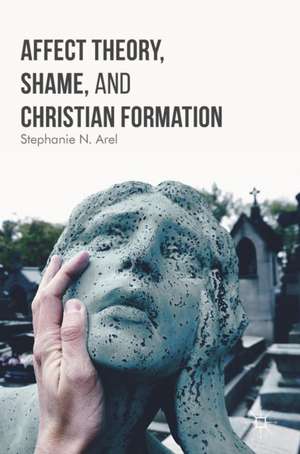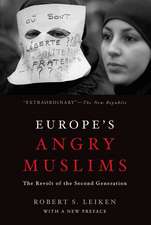Affect Theory, Shame, and Christian Formation
Autor Stephanie N. Arelen Limba Engleză Hardback – 17 noi 2016
| Toate formatele și edițiile | Preț | Express |
|---|---|---|
| Paperback (1) | 721.33 lei 6-8 săpt. | |
| Springer International Publishing – 28 iun 2018 | 721.33 lei 6-8 săpt. | |
| Hardback (1) | 726.06 lei 6-8 săpt. | |
| Springer International Publishing – 17 noi 2016 | 726.06 lei 6-8 săpt. |
Preț: 726.06 lei
Preț vechi: 885.44 lei
-18% Nou
Puncte Express: 1089
Preț estimativ în valută:
138.98€ • 151.01$ • 116.81£
138.98€ • 151.01$ • 116.81£
Carte tipărită la comandă
Livrare economică 21 aprilie-05 mai
Preluare comenzi: 021 569.72.76
Specificații
ISBN-13: 9783319425917
ISBN-10: 3319425919
Pagini: 221
Ilustrații: IX, 206 p.
Dimensiuni: 148 x 210 x 19 mm
Greutate: 0.4 kg
Ediția:1st ed. 2017
Editura: Springer International Publishing
Colecția Palgrave Macmillan
Locul publicării:Cham, Switzerland
ISBN-10: 3319425919
Pagini: 221
Ilustrații: IX, 206 p.
Dimensiuni: 148 x 210 x 19 mm
Greutate: 0.4 kg
Ediția:1st ed. 2017
Editura: Springer International Publishing
Colecția Palgrave Macmillan
Locul publicării:Cham, Switzerland
Cuprins
1. Introduction.- 2. Interpreting Shame Affectively.- 3. The Cover-Up.- 4. Masked Shame.- 5. Touching Shame: A Pathway to Disinterment.- 6. Empathic Engagement.- 7. Conclusion.
Recenzii
“Affect Theory, Shame, and Christian Formation is a tremendous resource for psychologists, pastors, counselors, and scholars working to acknowledge and alleviate the suffering of survivors of violence. Not only does the book provide an insightful theological reading of shame, but it names the productive possibility of touch to uninter shame.” (Kathryn House, Pastoral Psychology, Vol. 69, 2020)
“This book provides a refreshing and challenging perspective on shame. … This work could prove beneficial for robust study and consideration of further research on the topic of shame and guilt.” (Alvaro Tejada, readingreligion.org, April, 2018)
Notă biografică
Stephanie N. Arel received her PhD from Boston University’s School of Theology, USA, and is currently a fellow at the Institute for the Bio-cultural Study of Religion at Boston University. She serves on the Intercontinental Academia on Human Dignity, hosted jointly by Hebrew University, Israel, and Bielefeld University, Germany. She holds a certificate in trauma modalities for clinical treatment from the New York Institute for the Psychotherapies, USA. Her research focuses on trauma, shame, and Christian formation. She recently co-edited (with Shelly Rambo) a collection of essays entitled Post-Traumatic Public Theology.
Textul de pe ultima copertă
This book addresses the eclipse of shame in Christian theology by showing how shame emerges in Christian texts and practice in ways that can be neither assimilated into a discourses of guilt nor dissociated from embodiment. Stephanie N. Arel argues that the traditional focus on guilt obscures shame by perpetuating the image of the lonely sinner in guilt. Drawing on recent studies in affect and attachment theories to frame the theological analysis, the text examines the theological anthropological writings of Augustine and Reinhold Niebuhr, the interpretation of empathy by Edith Stein, and moments of touch in Christian praxis. Bringing the affective dynamics of shame to the forefront enables theologians and religious leaders to identify where shame emerges in language and human behaviour. The text expands work in trauma theory, providing a multi-layered theological lens for engaging shame and accompanying suffering.
Caracteristici
Explores the implications of shame, more carefully distinguished from guilt, for theological anthropology Distinguishes how, in theological discourse, language about guilt eclipses shame, and thus has deleterious effects Integrates theology with the growing field of affect theory










